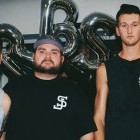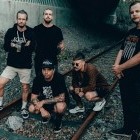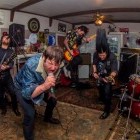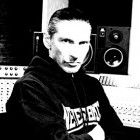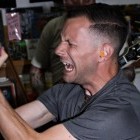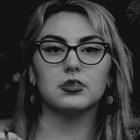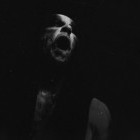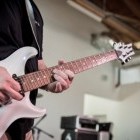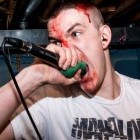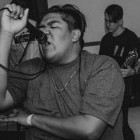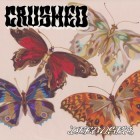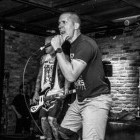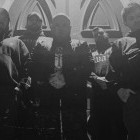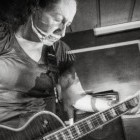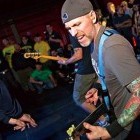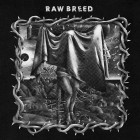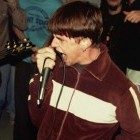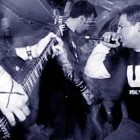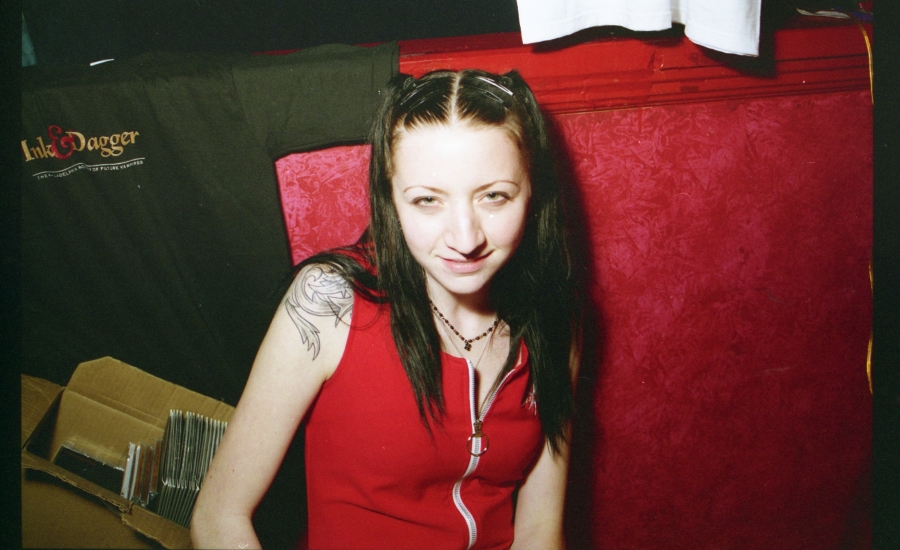
The first time and only time I saw Ashli State play bass was back in the mid-'90s. With her face covered in corpsepaint-like make-up, and dressed head-to-toe in black, she laid down the spidery bass lines that were the backbone of Ink & Dagger, one of the best bands to come out of the post-hardcore movement of that era. The group's DC punk meets goth rock songwriting style—plus their fully realized conceptual angle (vampires playing punk, etc.)—was a kick in the ass our scene needed then.
A Louisville punk scene staple, Ashli has also played in such bands as Guilt and The Telephone Man. Since I've been on an Ink & Dagger bender for the last month or so, I decided to ask Ashli if she would be down to do an interview on the site. As busy as she is these days with work, she still graciously accepted my request.
Where were you born and raised, and what were you like as a young kid?
I was born and raised in Louisville, KY. As a young kid, well… I was damaged goods at a very early age. I am the youngest of three and because of the age gap between my siblings and I, I was, in essence, an only child. My parents divorced when I was seven and did the best they could but from what I remember, my childhood was anything but happy. I never felt comfortable in my skin and learned that it didn’t matter what I wanted, needed, or felt. I was inadvertently taught that my feelings were wrong unless they didn’t make someone uncomfortable. I began to internalize everything and became passive-aggressive. I felt a visceral reaction to everything and my most familiar feelings were fear, nausea, sadness, yearning, and anger. Which, of course, led to no self-worth and no self-esteem. I think the most joy I found came from listening to music.
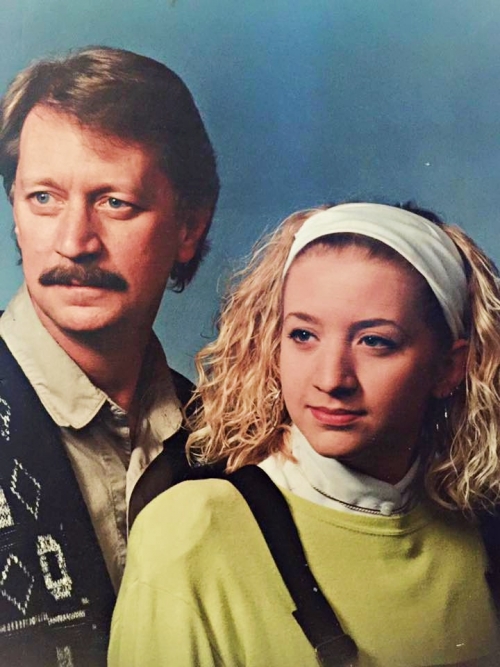
Did you take to music early on?
My dad’s side of the family is very large and most are musically inclined. There was always a piano or acoustic guitar around or someone, or many, singing. The first band I remember liking on the radio was Blondie. But my family would get together on the weekends and play/sing the same repertoire of songs every time. I loved it! My dad plays guitar and sings and I would always beg him to play “Lookin’ Out My Back Door” by Creedence Clearwater Revival. He did some Johnny Cash, Ray Charles... I loved “What’d I Say," still do—and some old folk type songs that I’ve researched and can’t find where they originated. In middle school I got my first “jam box” and cassette tape; it was Olivia Newton John’s “Physical.” This cracks me up by the way. My brother listened to bands like AC/DC and KISS, and I started to like some of that stuff but it got somewhat derailed by the '80s music scene. I loved bands like Kajagoogoo, Duran Duran, Prince, Michael Jackson, Art of Noise, and Shannon’s “Let the Music Play.”
Instrument wise, I always gravitated toward the piano and remember playing, or creating some type of noise out of a horror film, since the time I could reach the keys. I mostly played classical music, until I found the sheet music for Mötley Crüe’s “Home Sweet Home.” And one of my aunts and I would always play duets like "Chopsticks," "The Garbage Man," "The Boogie Woogie," and things like that. In fifth grade, I joined the school band and learned to play the flute and eventually went on to learn the oboe, piccolo, and clarinet. I’m not saying I was good at all of these, I am obviously no prodigy, but I played well enough to be in the band. I was definitely a band nerd. In high school I played flute, side-line percussion, and was drum major my senior year…for what had become a very tiny marching band. I did one year in marching band at University of Louisville and still love all that stuff.
What kind of student were you?
Other than my conduct, I did pretty well in school until I was a sophomore in high school. At that point the grades just fell off and I barely graduated by the mercy of one teacher. I was never able to focus much on homework or anything else because my anxiety was so out of control. All I could think about was my home life. I didn’t really hang out with anyone because I was so withdrawn and pretty painfully insecure. I usually had one friend that I was somewhat close to.
Did you hang out with the punk/hardcore/metal kids in school?
Around my junior year, maybe, there were some punk rock/skateboarding, unsavory types of kids who showed up and only through the lunchtime flirty harassment of one skater did I eventually start hanging with this crowd. I loved the authenticity I found in these people. It was somewhat awkward though because not only was I in band, I was also in JROTC in all my high school years. I found all these things I loved but I got poked at and made fun of from all directions; character building, I suppose.
At what point did you start going to local punk/hardcore/metal shows, and who were some of the first bands you saw live?
I started going to shows sometime around 1988. One of the first shows I saw was right across the river in Indiana and Dag Nasty played. I cannot express the feelings I had. I was beyond ecstatic and couldn’t go to enough shows. Some of my favorite local bands (there were so many I’m going to forget some) were Kinghorse, Endpoint, Undermine, Rodan, Crain, Spot, and Oblong Box.
The first band I read about that you were in was Snakeater.
My memory is so vague on so much of this that I probably won’t have much to tell you. It was short-lived but it was the first band I played in and I was stoked about it even though it was on such a different platform than any other music I played and I had no idea what I was doing. We recorded two songs for a Three Little Girls compilation of local bands [The Aftereffects of Insomnia Volume 2]. Sean Mclaughlin of Undermine played drums, John Daniels on guitar (who went on to play in The Quiz and possibly others), and Perry Cox on guitar. I’m not sure of other projects Perry did. Of all those people I only ran into Sean frequently and lost touch with the others until recently. We played our first and only show at The Machine, a laser tag arena that went on to host some pretty amazing shows.
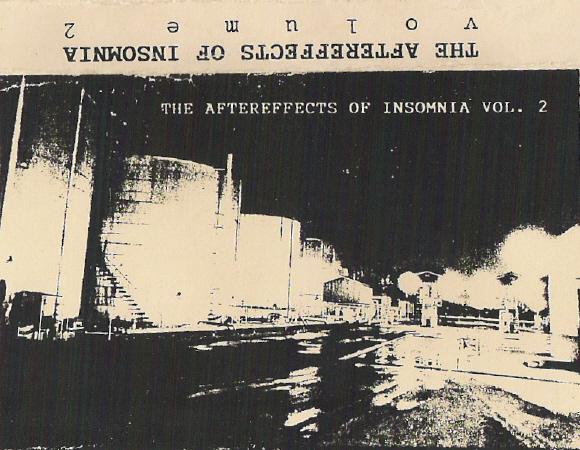
Your next played in The Telephone Man, which also featured guitarist/singer Matthew Ronay and Scott Richter, who not only played in Sunspring and Metroshifter, but also owned Slamdek Records. How did you come to join that project, and what was the experience like?
Honestly, I don’t remember how it came about, but Scott didn’t play in the band when I was in it. I think he may have played with them a few times after I left, but I’m not sure. This band and its members had a very sensitive side and a lot of passion so practices were usually pretty mellow and we worked pretty well together. There was a sensitivity in all of our interactions that made it very comfortable. I loved this band but I still had this insatiable desire to be in something heavy and then I was asked to play in Guilt. I’m pretty sure I wanted to do both but that wasn’t ok with The Telephone Man. It was kind of a dramatic exit…very much like breaking up with a boyfriend, but isn’t it always.
This was happening in the early ‘90s, a period when the Louisville punk/indie scene was getting a lot of attention from around the country. What do you remember about that time, and did you realize how great it was while it was happening?
I know I was having a lot of fun and going to every show I possibly could. I don’t know if I knew just how awesome it was because I never had lived anywhere else and hadn’t gone to many out of town shows, so I had nothing to compare it to. It was such a big scene for a small city and we all knew so many people from shows and hanging out in parking lots. There are so many stories I could fill a book. For me, although, I still had so many issues, it was pretty fantastic. I was coming out of my shell, I had found this amazing world of punk rock and hardcore, I felt more comfortable around people than I ever had. I was playing music, and to the extent that I would allow people in, I had a group of people that felt more like friends than anything in the past.
SEE ALSO: 10 Newer Hardcore Bands Featuring Veteran Musicians
How did you end up joining Duncan Barlow in Guilt?
I was still playing in The Telephone Man and going to school a U of L when one day while sitting in the student center eating lunch [guitarist] Kyle Noltemeyer came up and talked to me for a minute and asked me if I wanted to play in Guilt. I don’t know if he could tell but I was so ecstatic I wanted to get up and jump around and I’m sure the cheese on my face was from ear to ear [laughs].
Guilt ended up joining the Victory Records roster for the first album, Bardstown Ugly Box, in 1995. What do you remember about working with Tony Brummel and the rest of the Victory staff? Was that a positive experience? It was obviously already a pretty big label by that point.
I didn’t have any experience with getting signed nor did I know anything about it. And it was the kind of situation where I wanted to learn and be involved but it just didn’t seem to work that way in this band. I really only ever met Tony and some of the staff. Other than not knowing anything that was important to know when getting signed, I was really excited to know Victory was going to sign us.
How much touring did Guilt do after the first album? What were some highlights from those shows?
I don’t feel like we did “tours” as much as we would travel out of town for the weekend to play a show or a festival and play shows locally. I didn’t go on the one West Coast tour Guilt did and I really wish I had because I stayed home for a reason that was dictated by my abandonment issues. So, I lost out on that one. I’m pretty sure that my own brain held me hostage most of the time. Youl might be surprised to hear that I actually do like the people who were in that band, but I would have to say a highlight at the time would probably be if Duncan and I didn’t want to kill each other. We did have fun, too [laughs].
I recently interviewed Matt Weider, and he told me this about his time in Guilt: “We we're all friends but the Enkindels guys were a lot more happy-go-lucky, while the Guilt camp was way more serious and coming from a much darker place.” Do you agree with the idea that Guilt was coming from a dark place?
I think that part of Guilt was coming from a dark place and it was appropriate for that band. But for sure, the Enkindels were polar opposite to Guilt.
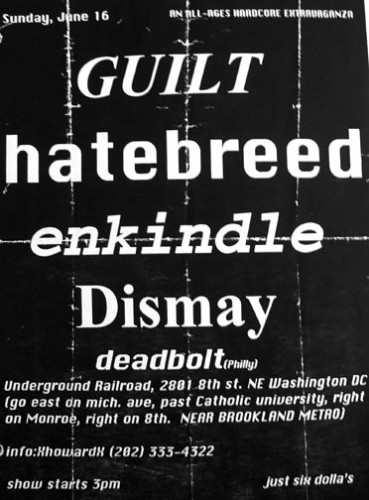
The next band you played in was Ink & Dagger. I’ve always wondered how you ended up joining them since they were based out of the Philadelphia area.
On one of our short tours to the Northeast we met and hung out with Ink & Dagger and it was mentioned that they might be looking for a bass player. I thought it would be fun but didn’t think too much about it until Guilt was on the outs. When Guilt was done I still almost didn’t go but I took the leap, as usual.
How did you feel about the makeup and overall theatricality of Ink & Dagger? Did it take some convincing to wear the stage makeup and buy into the whole package?
I felt really weird about wearing make-up and despite all my love for costumes and Halloween I wasn’t sure I wanted to do it. But if I wanted to play in that band I had to. Towards the end of my time they were wanting to move away from wearing make-up and I wanted to keep doing it.
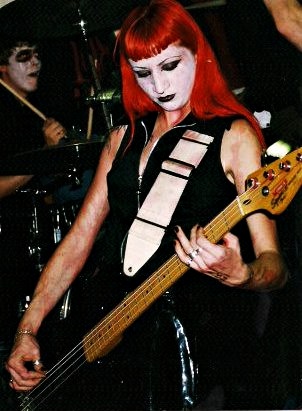
You played on my favorite Ink & Dagger release: Drive This Seven Inch Wooden Stake Through My Philadelphia Heart. I especially love how your bass cuts through on the recording.
I remember it was in some basement type small studio and I was pretty nervous. I think I played just ok, but I like it. My favorite song to play off that 7” was "Shadowtalker." I like that song in general but the bass lines were really fun to play. Overall, my favorite Ink & Dagger song is "Changeling."
There's an air of mystery around Ink & Dagger, which certainly was fed by the look of the band, and the lyrical concepts in the early stages. What was it like behind closed doors with those guys back then?
I didn’t hang out with them much outside of band practice, but that’s how I was in most of the bands I was in. There were members in that band that I liked pretty well, but I was never comfortable. It didn’t feel like we were friends. But I do have some strange kind of special love for that band.
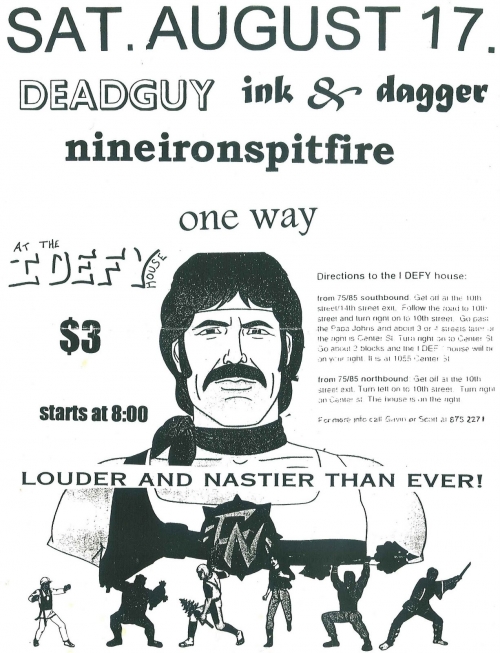
Of the shows you played as a member of Ink & Dagger, which ones particularly stand out to you? Were there ever any sticky situations?
I’m laughing when I say this, but I think Ink & Dagger was a sticky situation in and of itself. The first time I played with them was intense for me because everyone liked them so much. It was fun to see people just going nuts.
We played a festival in Wisconson, I believe, and had a bunch of garlic cloves thrown at us throughout the first song. That was interesting…and smelly. But, what stands out the most in all of my band experiences is the 2 1/2 month tour we did with Botch and Nineironspitfire. There are too many stories but that was the craziest most out of control tour I have been on. I participated in some things that I am not really proud of, but I also had some hilarious experiences. I think most of us were pretty broke on that tour and two of us played a game called “What would you do for a 40?” Now I know where your mind can go with this and it was nothing outside of the realms of eating a mix of everyone’s food or licking the back of van, but it got pretty funny [laughs]. I think my favorite is that we pooled together a whopping $40 to get one of the guys in another band to run bare ass naked from one end of a shopping mall to the other. Those are probably the mildest story I can allude to [laughs].
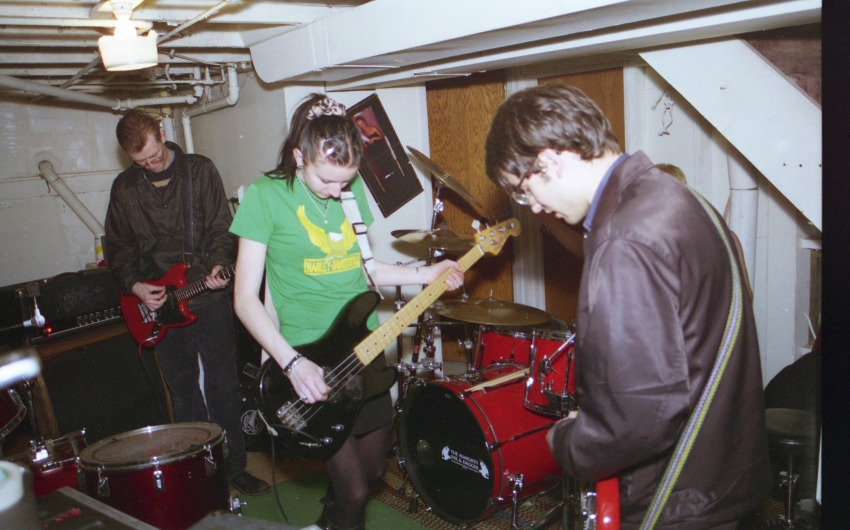
Why did you part ways with Ink & Dagger?
It wasn’t by choice and was done in a pretty shitty way but it was for the better.
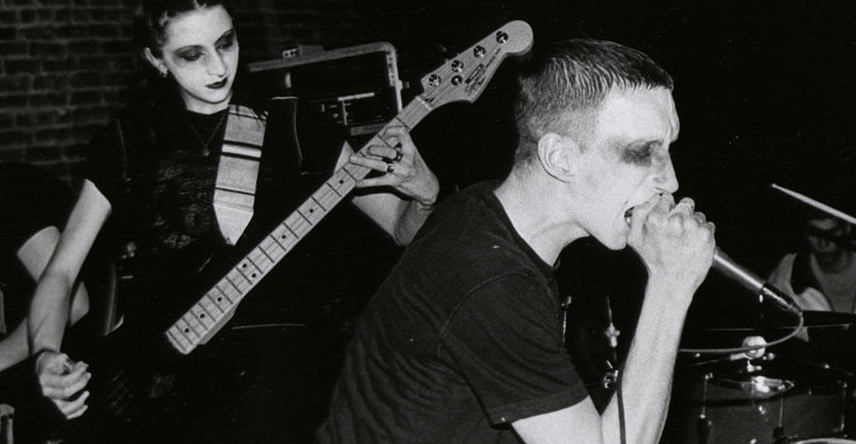
What’s the story behind Armbar? That’s a band you were in that I know nothing about, outside of the name.
They were around for a short while before I joined. It was a Louisville hardcore-ish/metal band and I only played with them for a short time. I played one show with them and there was an incident between some crew and one of our guitar players and I was done.
At one point, I know that you lived in Seattle and played in a very early version of Playing Enemy, the band that also included Demian Johnston (Undertow, Nineironspitfire) and Andrew Gromley (Rorschach, Kiss It Goodbye) within its ranks. Was that a situation where you moved there to be in the group?
Originally, I was moving there be to with a boyfriend and play in the band but the relationship dissolved before that happened. I met Demian on the crazy tour I was just talking about and he had talked about a side project he was doing, and again, it was mentioned that they might need a bass player. But I lived in Philly and still in Ink & Dagger. Shortly after tour, I learned I was no longer in Ink & Dagger, so I moved back to Louisville for about a year with plans of moving to Seattle and did so.
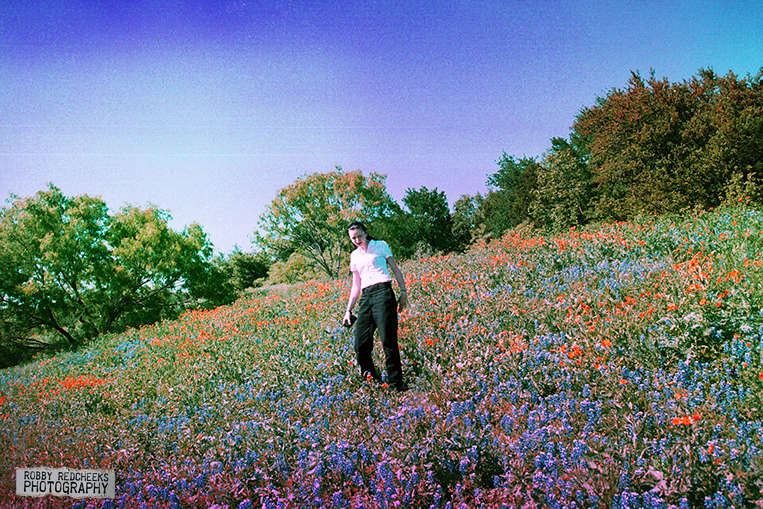
Why didn’t you stay in Playing Enemy?
If there is any band I regret leaving, it’s this one. I felt like we were all on the same page and Demian and Andrew were kind and comfortable to work with. They were patient and everyone was involved in everything. I doubt that it was the same for them, but for me, it was the best fit. Turns out it was for a reason I care not to share. I was unsure why I had to move home, I just couldn’t get it out of my head and the feeling was overwhelming. This was another pretty low point in my life.
SEE ALSO: The Heavy Metal Roots of New York Hardcore
What have you been up to in the years since? I know you studied art back in Louisville.
After I moved home from Seattle, I really kind of let go of playing music. I had already been drinking too much for years and it just progressed. I just kept trying to fix myself and I couldn’t and I couldn’t stand myself either. In 2006, I went to treatment and I’ve been sober since. Much of my life revolved around recovery and still does although there are ebbs and flows. I started over in college and graduated with a Bachelor of Fine Arts with a concentration in sculpture. I did this because I never thought I was capable of completing a college degree. I played a reunion show and the Burning Fight festival with Guilt and that was a blast. I go to shows and have more fun than ever—and I remember it [laughs]. I’ve worked in a garden on a farm for seven years and hope to continue doing art and have been picking up my bass again. When I can work through some of my anxiety around playing, I will be ready to do a band again. I’m getting itchy but still in my own way. Most of all, I’m on the difficult journey of learning to love myself.
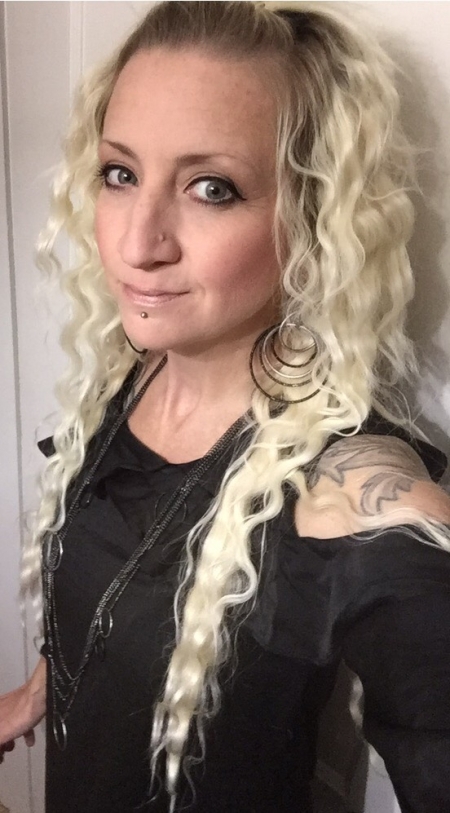
Do you still keep up with everyone from the old Louisville music scene?
Of course not everyone, but I couldn’t be happier with how many people I do still talk to on occasion, and how many people I still run into at shows, it’s pretty incredible.
Of all the bands you’ve played in throughout the years, which one did you have the most fun in?
Guilt feels like home but Playing Enemy was the most comfortable.
Last question: If you had to pick one band from the ‘90s Louisville scene, which one would be your all-time favorite, and why?
Kinghorse. I loved them the first time I saw them. I was young and angry, and they were just pissed off enough for me to have an instant connection with. I tend to keep it pretty real so I hope I haven’t depressed the shit out of everyone. I am grateful to everyone along the way who has supported any band and I hope they continue to do so! Big Love!
Tagged: guilt, ink and dagger

